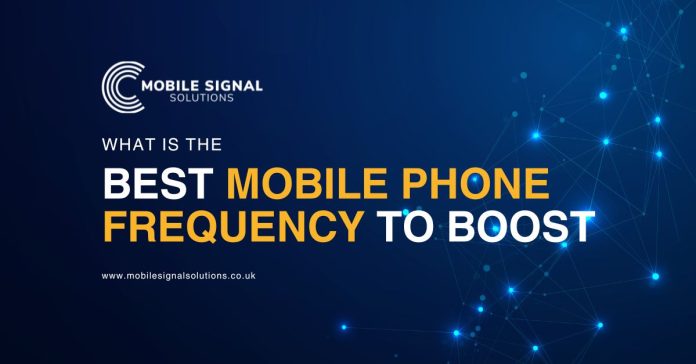
When considering which mobile phone frequency is the best one to boost using a mobile phone signal booster, the answer will depend on what the needs are for the area you are trying to boost. All Boosters come with a choice of which frequencies you can have included, the more frequencies you add the more expensive the booster becomes. During this article we will look into what each frequency means in the UK, so you can make the correct decision on which type of signal booster to purchase and how to set it up correctly.
It is important first to understand mobile signal frequencies, Mobile signal frequencies are sets of frequency ranges within the ultra-high frequency band that have been allocated for cellular-compatible mobile devices, such as mobile phones, to connect to cellular networks. Most mobile networks worldwide use portions of the radio frequency spectrum, specifically allocated to the mobile service to transmit voice and data between mobile phones and cell towers. The two main factors the frequency you are using will determine is the distance it travels and how much data it can carry while traveling.
The lower the frequency the further it travels, so this is important for people living in rural areas away from the base station, here your outdoor signal is most likely one of the lower bands, 700MHz, 800MHz or the GSM 900 MHz band. In this case your booster will need to have the ability to boost the lowest frequency bands. At present, in June 2024, the lowest band that is broadcast in the UK is 694MHz, which is the lowest part of the range from 694 Mhz to 790MHz, more commonly referred to as the 700MHz band.
What Sets the Different Bands Apart
The 700Mhz band is expected to carry 4G and 5G and will travel many miles further than the higher 2600MHz band, which is the second 5G band being rolled out, predominantly in the cities where it can handle the large volumes of devices and data.
The 2600Mhz can not be boosted as of today but is expected to be legal in the UK at some stage in the near future, as it is already rolled out across European networks, at present, in 2024, Ofcom regulations do not allow this band to be broadcast in the UK, however, as mentioned it is allowed across most countries in the EU.
The 800Mhz band is predominately used by UK mobile networks for 4G. It is a very important band to have included in any booster you purchase, this is because it gives a certain amount of future proofing as 4G is likely to continue on the 800MHz band into the next decade. This band travels a good distance from the base station to give you a good input signal, its data carrying capacity will always be lower than the higher bands, but it is a good overall band which we recommend you ensure your booster includes.
The 900MHz band is one of the earliest GSM technology deployed and remains an important band for UK networks for making 2G voice calls especially for o2 and Vodafone. Both of these network providers are broadcasting 2G across the 900MHz band, if calls are important to you, you have WiFi in place for data and you use either Vodafone or o2 , you should always ensure the 900MHz band is included in the booster you purchase.
1800MHz is one of the dominant bands for EE and has been used for 4G and voice, it will continue to be an important band for any EE users. For clients not using EE this band can be largely ignored as it is rarely used by the other networks. As 1800MHz travels shorter distances then the 800MHz bands it is the 800MHz 4G band which is used by the other networks like Vodafone, o2 and Three.
The 2100MHz frequency band is predominately used for 3G. It is expected to be switched off by 2033 in the UK, with networks like Vodafone already starting to switch off 3G on 2100MHz in major cities. Mobile Signal Solutions commercial clients have already seen many towers broadcasting on 3G cease to operate, and we have been working hard on upgrading these systems to 4G and 5G across the other bands.
The 2600MHz band travels only a short distance before losing its signal strength; it does however have the ability to carry much more data than any other existing band. It will broadcast at very high speed, so this band suits large population centers. If you live in a city, a 2600MHz frequency band built into the booster will help future proof you. This is only available to commercial clients of Mobile Signal Solutions at present and is not an option on self install units.
Best Signal boosters frequency by category
Now that we’ve discussed what each of the main frequency bands are, let’s take a quick look at which frequency band is best for you to boost depending on your needs;
- The best mobile frequency to boost if you are an EE customer is 1800MHz
- The best frequency to boost if you want Vodafone or o2 voice calls is 900MHz
- The best frequency for 4G across all UK networks is 800MHz
- The best for Three and for all 3G is the 2100Mhz frequency band
- For cities 5G boosting we recommend the 2600MHz band once legal to boot
- For rural areas the 700MHz band is best for 5G.
If you are interested in boosting your mobile signal for either commercial or domestic buildings, understanding the needs of your signal booster is essential in helping you make the right choice. At Mobile Signal Solutions we can help you to choose the best signal booster for your situation, and in larger commercial installation projects, help you create a fully bespoke signal boosting system to meet your needs. Get in touch with one of our advisors today at [email protected] or call us on 01442 780741





